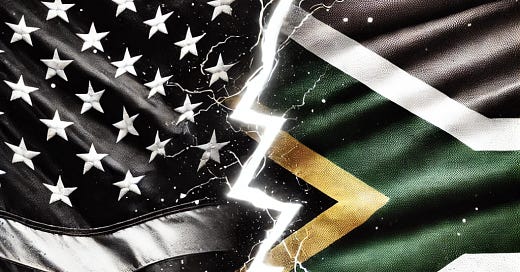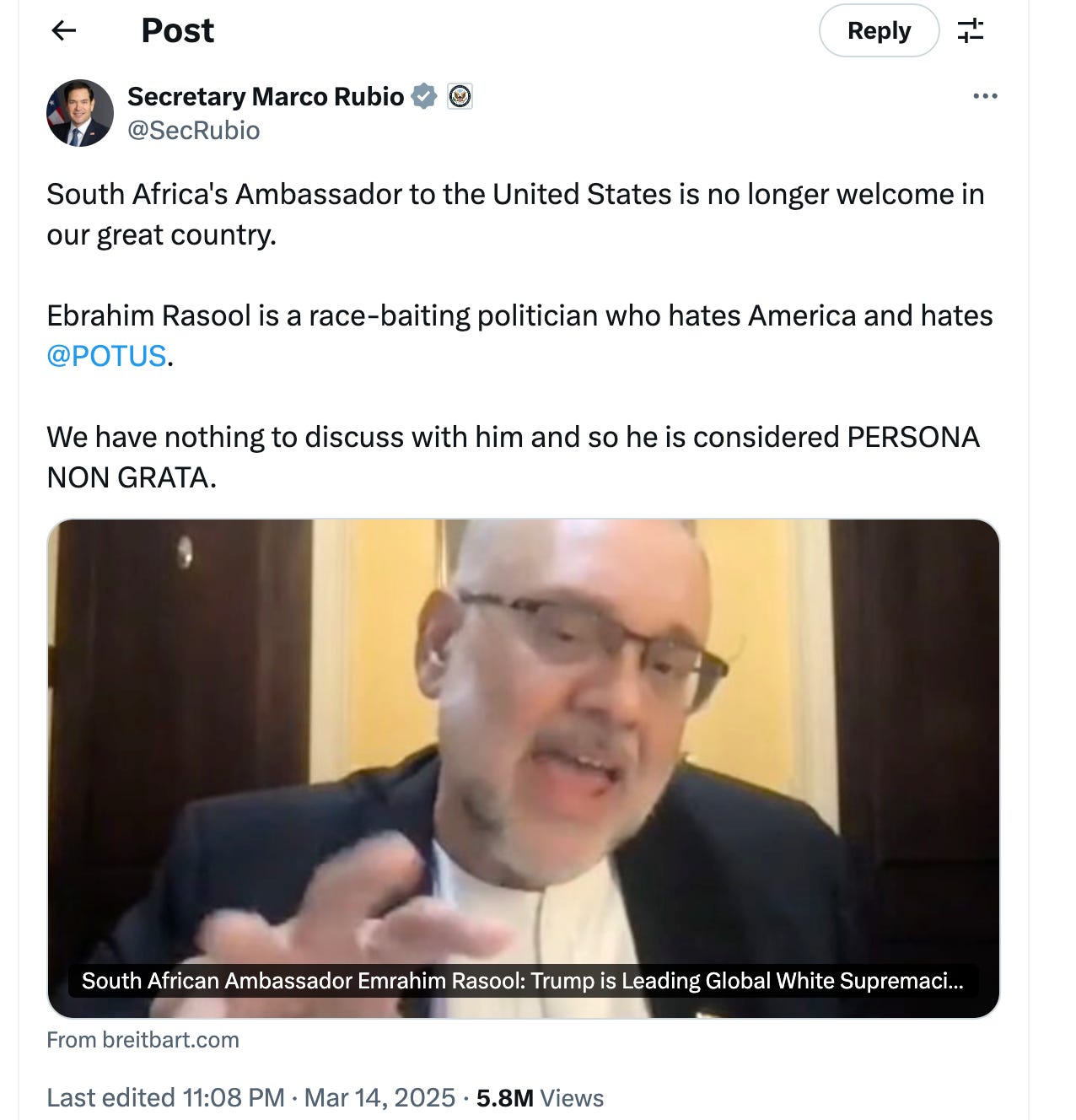Dear South Africa Insight readers,
I must apologize for the long silence since my last newsletter. I've been immersed in republishing an old Boer War chronicle that's nearly ready – more on that soon. Meanwhile, South Africa's political landscape has undergone seismic shifts that deserve our attention.
The diplomatic clash between South Africa and the United States has finally brought international attention to issues we've discussed for years in these newsletters. The land expropriation debate has moved from South African parliamentary chambers to the world stage, with potentially far-reaching consequences. The ANC's decision to investigate Afriforum and Solidarity for treason—simply for lobbying against policies that threaten property rights—reveals their authoritarian instincts when faced with international scrutiny. These charges aren't about protecting South Africa's sovereignty; they're about silencing critics who've successfully exposed the regime's failures to a global audience. It's a desperate move from a government increasingly cornered by its own destructive policies.
Land Expropriation Meets International Pushback
When President Ramaphosa signed the Expropriation Act on January 23rd, enabling land seizures without compensation, few expected the swift international response that followed. President Trump's decision to freeze $500 million in aid and threaten South Africa's trade benefits under AGOA represents the first meaningful external check on the ANC's increasingly radical policies.
This is precisely the kind of pressure South Africa has needed. For too long, the international community has turned a blind eye to the ANC's disastrous governance, excusing everything from corruption to racial discrimination under the banner of "correcting historical injustices." The reality is that expropriation without compensation will devastate agricultural productivity and food security – just as it did in Zimbabwe – while doing nothing to address the actual economic challenges facing South Africa.
Ernst Roets Breaks Through Media Barriers
The watershed moment came on March 3rd when AfriForum's Ernst Roets appeared on Tucker Carlson's show, finally bringing these issues to mainstream American audiences. For years, the plight of white South Africans, particularly farmers, has been ignored or downplayed by Western media. Roets' appearance changed that dynamic overnight.
What made Roets' interview so powerful was his refusal to mince words. He clearly articulated how the ANC uses white South Africans as scapegoats for their own governance failures, directly connecting the dots between anti-white rhetoric and policies like land expropriation. Most importantly, he warned of the "Zimbabwe-style collapse" that awaits if these policies proceed – a prediction supported by decades of evidence from across the continent.
The impact was immediate. Within days, conservative media outlets across America were discussing South Africa's land policies, farm murders, and the broader pattern of anti-white discrimination. After years of being dismissed as "right-wing paranoia," these concerns have finally started to receive the serious international attention they deserve.
True to form, the ANC responded not with reasoned argument but with authoritarian suppression. The Hawks' investigation into "treason" charges against AfriForum and Solidarity reveals the regime's true nature. When unable to win the debate, they criminalize dissent – a tactic straight from the playbook of every failing socialist government.
These investigations aren't about protecting South Africa's sovereignty. If that were the case, the ANC would be equally outraged by the DA's Washington lobbying efforts. No, this is about silencing specific voices – those that dare to speak uncomfortable truths about the direction of the country.
The parallels to the early days of Zimbabwe's collapse are striking. As Mugabe's failures mounted, he increasingly resorted to labeling critics as "enemies of the state" and "agents of imperialism." The ANC is following the same path.
Diplomatic Meltdown
Parallell with the treason charges, Ambassador Rasool's comments linking Trump's MAGA movement to "white supremacy" were a desperate attempt to reframe the debate along familiar racial lines. This tired strategy – deflecting legitimate criticism by crying racism – may still work in some circles, but it's losing effectiveness internationally. His expulsion signals something profound: the world is growing weary of South Africa's reflexive race-baiting. For decades, the "rainbow nation" mythology has shielded the ANC from criticism while the country steadily deteriorates. Now that shield is cracking as reality becomes impossible to ignore. When substantive arguments fail, crying "racism" becomes the last refuge of a failing political system, and Rasool's diplomatic blunder perfectly illustrates this desperation.
The Broader Context: A Failing State
The diplomatic crisis occurs against the backdrop of South Africa's continued descent into state failure. Rolling blackouts persist despite promises to the contrary. Water infrastructure collapses while corruption scandals multiply. Crime rates remain among the world's highest, while the police force is increasingly politicized.
These failures aren't accidental – they're the inevitable result of the ANC's governance model: racial preferences over competence, ideological purity over pragmatic solutions, and party loyalty over national interest.
The land expropriation push isn't about addressing historical injustice. If it were, the ANC would focus on utilizing the millions of hectares already under state control or supporting emerging farmers with training and resources. Instead, this is about distracting from the party's failures ahead of elections and satisfying radical elements within the coalition.
For decades, the ANC has perpetuated a narrative of "original sin" — the idea that South Africa's problems began the moment Jan van Riebeeck arrived in 1652. This concept of inherited guilt has been weaponized to frame all contemporary issues as direct consequences of white arrival rather than ANC mismanagement. Former President Zuma's infamous statement that "all South Africa's problems can be traced back to 1652" exemplifies this thinking.
By pushing the notion that poverty exists primarily because whites "stole the land," the ANC creates a convenient scapegoat while absolving themselves of responsibility for 30 years of failed governance. This narrative does double duty — it justifies punitive policies against white farmers while explaining away the government's inability to improve living conditions for the black majority. The psychological impact is powerful: millions of South Africans have been conditioned to believe their economic struggles stem not from corruption and incompetence, but from history that can only be remedied through expropriation.
What This Means for White South Africans
For white South Africans, especially Afrikaners, this international attention represents a rare opportunity. After decades of being ignored by the international community, the concerns are finally being heard. The narrative is shifting from the simplistic "oppressors vs. oppressed" framework to a more nuanced understanding of South Africa.
Organizations like AfriForum deserve immense credit for their strategic persistence. Rather than accepting their assigned role as villains in the post-1994 national story, they've consistently advocated for minority rights while documenting the consequences of the ANC's policies.
The community of Orania also stands as a living rebuke to the ANC's narrative. While the government fails to provide basic services throughout the country, Orania has built a functioning society with reliable electricity, clean water, and safe streets – all without government assistance. This success undermines the central premise of ANC rule: that centralized control is necessary for progress.
Looking Forward
The diplomatic crisis will likely intensify before it resolves. The ANC cannot back down without changing their own foundational narrative – a narrative they've cultivated for three decades. This isn't merely about policy flexibility; it's about an entire worldview built on historical grievance and racial categorization. To acknowledge that land expropriation without compensation might be destructive would undermine the foundation of their being.
For the ANC leadership, this narrative isn't just political rhetoric – it's the source of their power and privilege. They've convinced millions that economic liberation can only come through their specific brand of redistribution. To abandon this position would expose the uncomfortable truth that after 30 years in power, they've failed to deliver meaningful economic improvement for the majority while enriching their own political elite.
Meanwhile, the U.S. has little incentive to soften its stance, especially given South Africa's increasing alignment with America's geopolitical rivals. South Africa's embrace of Russia and China, its refusal to condemn the Ukraine invasion, and its aggressive posture toward Israel have all contributed to Washington's willingness to apply pressure.
What we're witnessing isn't just a disagreement about land policy – it's the collapse of the post-1994 diplomatic consensus that treated South Africa with kid gloves despite its increasingly anti-Western positioning and domestically anti-white policies.
For those concerned about South Africa's future:
Support the international spotlight – The more attention focused on South Africa's policies, the harder it becomes for the ANC to implement its most destructive measures without consequence. Start by sharing this newsletter:
Build parallel structures – Communities that can provide their own security, utilities, and social services will be most resilient as state capacity continues to erode.
Prepare for volatility – Economic sanctions, while necessary, will create additional hardship in the short term. Resilience planning is essential.
For points two and three, I'm busy editing a documentary about Bitcoin adoption in South Africa - it will be something truly special. Be sure not to miss it by subscribing:
The ANC's ideological commitment to land expropriation without compensation, combined with its broader hostility to property rights, makes conflict inevitable. The critical question isn't whether these policies will fail – history shows they always do – but how much damage will be done before that failure is acknowledged.
For the first time in decades, however, there's reason for cautious optimism. The international community, or at least significant parts of it, appears willing to hold the South African government accountable for its actions. That accountability, long absent, is precisely what South Africa needs to avoid Zimbabwe's fate.
Meanwhile, Bitcoin offers another beacon of hope. Decentralized alternatives provide South Africans with a powerful tool for financial sovereignty. My upcoming documentary will explore how ordinary South Africans are already using Bitcoin and demonstrating new pathways to freedom.
Best regards,
Jonas Nilsson





If you are going to use language like this you have missed the point.
"For too long, the international community has turned a blind eye to the ANC's disastrous governance".
Prior to European arrival to South Africa the Blacks had barely 20% of the land area and that was on the East coast. They now have control of the lot. The Khoi & San are largely ignored.
Expropriation of White land that the Blacks never historically possessed is theft & fraud.